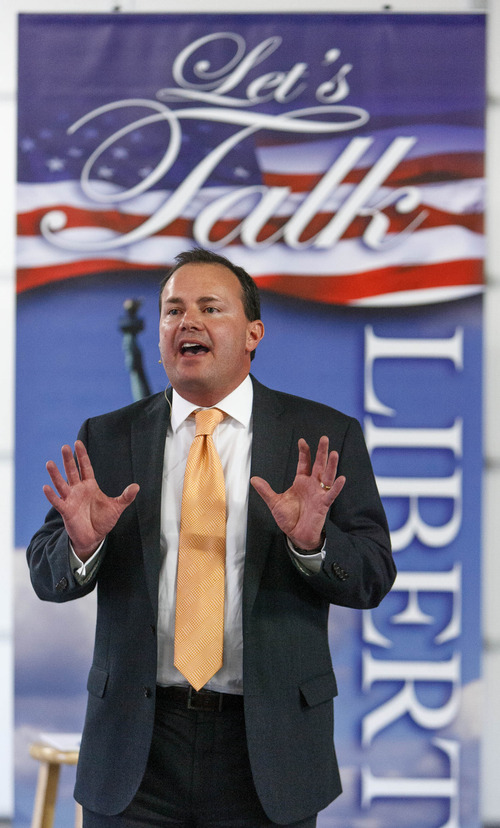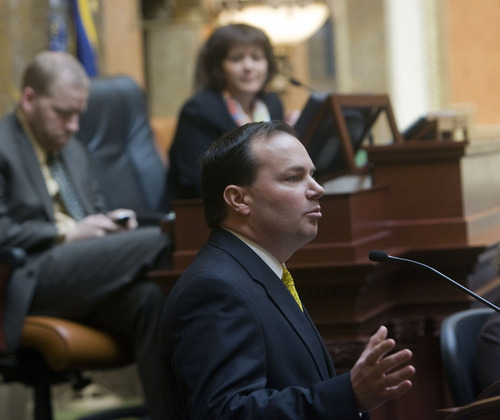This is an archived article that was published on sltrib.com in 2014, and information in the article may be outdated. It is provided only for personal research purposes and may not be reprinted.
Two conservative senators agreed on the disease, but not necessarily the remedy at a gathering focused on government regulations.
Sen. Mike Lee, R-Utah, sponsored the event Thursday in Salt Lake City, where he equated the government to helicopter parents hovering unnecessarily over their children, and his solution is to require Congress to get more involved in the federal rule-making process that affects everything from health care to the type of light bulbs people can buy.
Sen. Tom Coburn, R-Okla., who headlined Lee's first Utah Solutions Summit, had a more radical solution. He wants the states to convene a constitutional convention to draft a series of amendments meant to reduce the size and scope of the federal government, including its role in drafting voluminous rules based on the laws Congress enacts.
"I don't think Washington is ever going to fix itself," said Coburn, who is retiring from the Senate and promises to barnstorm the states to support his idea. "I think the career politicians in Washington are going to continue to vote for things that enhance their careers."
But a constitutional convention is one solution that goes too far for Lee, one of the Senate's most conservative members. He notes that every constitutional amendment has been approved by Congress and then ratified by the states. The country has never utilized the provision allowing for states to convene a convention, and he worries that it could lead to amendments that he couldn't support.
Lee proposed a more limited way to rein in federal agency regulations.
He has offered legislation requiring Congress to quickly vote on major rules, those that have at least a $100 million impact on the economy. The House has passed such a bill, but it has gone nowhere in the Democratic-controlled Senate.
"Forcing Congress to take ownership over the laws imposed on the American people will improve the incentives for us to finally get those rules right," he said.
Opponents of the legislation, primarily Democrats and environmentalists, argue that in practicality this act would allow just one chamber of Congress to stop rules it opposes.
Lee, speaking before about 200 business and community leaders, blamed Congress for the problem, lamenting that many laws direct employees of federal agencies to write detailed rules.
He equated it to subcontracting, which allows the members of the House and Senate "to accept all of the credit and none of the blame." If a law works as expected, members of Congress can crow about their achievement. But if a rule becomes onerous, they can blame federal bureaucrats.
"Right now the main reason government imposes onerous regulations is that no one gets fired for it," Lee said. "If Congress were directly accountable for them, you can be sure heads would roll in the next election."
Coburn argued that major constitutional changes, such as requiring a balanced budget and imposing term limits, would make members of Congress more accountable. He also wants to give regulators more authority as long as their actions are transparent and he wants Congress to start writing the detailed rules, which can often run into the hundreds, if not thousands, of pages when it involves complex areas of the law.
"Congress [members] has given away their right to rule so they wouldn't have to be responsible," Coburn said. "This is a dangerous thing for our liberty."
The forum also discussed regulatory burdens on the state and local levels and included an address from Lt. Gov. Spencer Cox, who heaped criticism on Congress, telling reporters that the lawmaking branch of government is worse than the bureaucratic rule-making system. He pointed to delayed rules on small aerial drones, effectively limiting an industry that could benefit society in a variety of ways, from tracking cattle for ranchers to hunting for missing people in remote areas.
"Have you seen Congress lately? If you think the agencies are broken, Congress is ten times worse," Cox said. "We have the weakest Congress probably in 100 years. It's really an embarrassment to the country."
Lee hopes to hold a similar forum each year focused on a different theme. The event was cosponsored by Utah Gov. Gary Herbert, the Utah League of Cities and Towns, the Utah Association of Counties and the Salt Lake Chamber.
The event marks a coming together of Lee, a tea party champion, and the Chamber, which has been critical of some of his positions, such as his opposition to a broad immigration overhaul and his fight to defund the Affordable Care Act, which led to a government shutdown last year.
Chamber President Lane Beattie introduced Lee, noting that while he has at times disagreed with Lee, he has respected the senator's drive to reduce regulations that can hamper business and economic growth.
Twitter: @mattcanham





